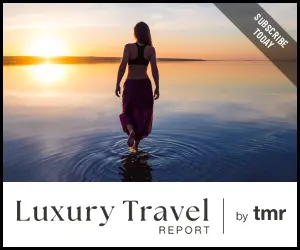New Marriott Report Shows Personalization, Wellness, and Nature Will Shape 2025 Luxury Travel
Luxury travelers in Asia Pacific want fewer crowds, more customization, and deeper wellness experiences, according to Marriott’s new 2025 Intentional Traveler Report.

Photo: Courtesy of Marriott International
Affluent travelers across Asia Pacific are rewriting the rules of luxury travel—and they’re not doing it on a whim. According to Marriott International’s new 2025 Intentional Traveler Report, released yesterday, high-net-worth travelers are shifting from spontaneous indulgence to values-driven, precision-planned experiences. And with 72% planning to increase their luxury travel spend this year, the message to advisors and brands is clear: Meet the moment, or miss the mark.
Personalization Is the Price of Entry
Forget room upgrades and custom welcome notes. Today’s elite travelers are looking for personalization at every touchpoint. An overwhelming 93% of respondents now consider tailored experiences non-negotiable, a steep climb from 83% last year. The desire spans private-access cultural experiences, hyper-curated itineraries, and concierge-led planning support.
This shift isn’t unique to Asia Pacific, though. A 2024 report from American Express Travel found that 84% of global consumers value brands that remember their preferences and tailor experiences accordingly. In the luxury sector, personalization has become the baseline for trust and loyalty, rather than just a value-add.
For advisors, this means rethinking packages and marketing strategies. One-size-fits-all itineraries are out; anticipatory service, AI-enhanced trip design, and boutique partnerships are in.
Wellness as the Purpose of the Trip
Wellness is now a central pillar of luxury travel, not just a perk. Marriott’s report reveals that 90% of HNW travelers in the region consider wellness offerings when planning trips, with 80% planning to spend more on wellness-focused trips in the year ahead.
And it’s not just about massages or yoga retreats. Today’s wellness travel includes everything from integrative sleep programs and forest immersions to in-residence nutritionists and sound therapy for families. Wellness seekers are staying longer, too: Dedicated retreats now average more than 10 days abroad.
This echoes a broader global trend. The Global Wellness Institute estimates that the wellness tourism market will surpass $1.3 trillion by 2025, growing nearly twice as fast as general tourism. For luxury operators, wellness can become a valuable storytelling and retention tool.
Nature-Focused Travel Now Signals Status
Luxury travel is increasingly heading off-grid—at least in spirit. Marriott’s data shows that 30% of HNW travelers are booking safaris, and countryside getaways, such as vineyard stays and nature lodges, have increased sharply, from 19% to 28% year-over-year.
The return to nature doesn’t mean sacrificing sophistication. Travelers are wanting remote retreats with luxury touchpoints, like spa treatments, bespoke dining, and sustainability as a core value. In fact, 91% say environmental practices influence their hotel decisions, making it a growing expectation, rather than a bonus.
Recent developments reflect this shift: Brands like Six Senses and Aman are expanding into remote settings with significant ecological footprints, while even established players like Ritz-Carlton are introducing conservation-forward experiences.

